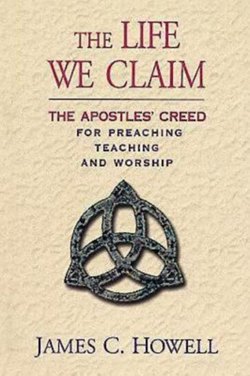Читать книгу The Life We Claim - James C. Howell - Страница 9
На сайте Литреса книга снята с продажи.
LESSON 3 A SUMMARY OF THE BIBLE STORY
ОглавлениеAll scripture is inspired by God and is useful for teaching.
(2 Timothy 3:16, AP)
A legend circulated in the early Church: after the Spirit descended on the disciples at Pentecost, Peter said, "I believe in God the Father Almighty." Andrew added, "and in Jesus Christ his only Son our Lord." And so they went around the table, a dozen disciples, a dozen sentences forming the Apostles' Creed. A lovely (if fabricated) legend.
Yet this impulse to trace the Creed to the living characters of the Bible is on target. "What the Scriptures say at length, the Creed says briefly" (Nicholas Lash).9 The Apostles' Creed is a quick summary of the sixty-six books of the Bible, a bird's-eye view of the high points of the story spanning thousands of years. How easy it is to get mired in the 1,189 chapters and 31,000-plus verses of the very long Bible; the Creed helps us get our arms around the big story, or perhaps the Creed helps the story of God's mighty acts get God's arms around us.
For centuries, the Creed was especially important, for a majority of Christians did not know how to read.10 So the Creed indelibly impressed on the eager but illiterate heart the story of God's love in this world. Perhaps in our own day, when people know how to read but often spend vast sums of time with higher tech media (or when people own Bibles that gather dust from lack of use), the Creed may be the most convenient vehicle to remind us of the one story that ultimately matters.
Notice the Creed isn't a list of dogmatic propositions. Its sentences are not like a deck of cards that could be shuffled and still be a creed. The Creed tells a story, in chronological order: God is first, then God creates; then God sends Jesus, who is born, dies, and is raised; and then the Holy Spirit dawns on the Church and its life. How fortunate we are that the Bible is a story and that the Creed is a story, for my life feels like a story. If I say, "Tell me about yourself," you don't really reveal yourself until you tell me a good story or two that unveils the depth of who you are. The Creed's words hang together with a plot; unlike a quiz in which the teacher says, "Only seven of these ten need be attempted in the allotted time," the Creed's phrases flow from one to the next.
The Creed's story flows from God to us, not vice versa. We know about God, not because we are shrewd or spiritual, but because God has lovingly, mercifully revealed God's heart to us in history. "God is the One who has made Himself known in His own revelation, and not the one man thinks out for himself and describes as God" (Karl Barth).11
Within the Bible itself, we discover several "creeds" used during Bible times. The ancient Israelites recited Deuteronomy 26:6-8 in worship: "The Egyptians afflicted us; we cried to the Lord; and the Lord brought us out of Egypt with a mighty hand" (AP). The early Christians recited (and probably sang) summaries of what they believed. "There is one God, and one mediator, Christ Jesus, who gave himself as a ransom" (1 Timothy 2:5-6, AP). "Christ was in the form of God, but emptied himself, born in our likeness, humbled himself, obedient unto death on a cross" (Philippians 2:6-8, AP).
Oddly enough, the best way to understand the Apostles' Creed is to dig into the Bible. If we don't know the Bible, or if we steel ourselves against the mysterious work the Bible can do in our souls, then the Creed will seem arbitrary: "We only discover the meaning of the Creed in the measure that the Bible stays an open book" (Nicholas Lash).12
The Bible, of course, requires interpretation. We think about it, probe, question its words, and let them question us.
Christianity is more than a set of devotional practices and a moral code: it is also a way of thinking about God, us, the world and history. For Christians, thinking is part of believing. Augustine wrote, "No one believes anything unless one first thinks it believable. . . . Not everyone who thinks believes, since many think in order not to believe; but everyone who believes thinks" (Robert Wilken).13
Some who explore the Bible and Creed think in order not to believe! But we want to think and believe, not to believe and avoid thinking, for Jesus told us the truth would set us free. Thinking, after all, is intensely personal, as we will see in lesson 4.
